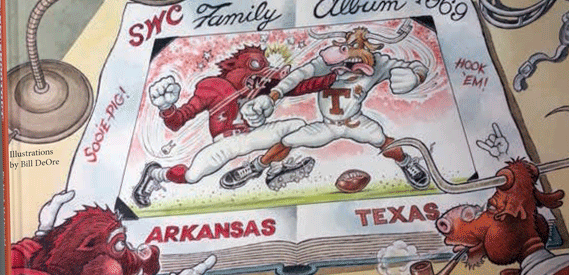Players from 1969 Arkansas-Texas game recall ‘vivid’ memories
by September 24, 2019 5:22 pm 1,003 views

Arkansas lost to Texas, 15-14, in the “Big Shootout” 50 years ago this December, and linebacker Mike Boschetti still hasn’t gotten over it.
“I wake up regularly at night, maybe once a month, and I’ll think about the two-point conversion, or I’ll think about (Jim) Bertelsen actually scoring the final touchdown,” he said. “And in both cases, had I taken a step outside … we would have stopped them, and we would have won.”
The merger and acquisition consultant shared his memories Tuesday, Sept. 24, along with defensive end and insurance agent Bruce James. They participated in a discussion led by Mark McDonald, author of “Beyond The Big Shootout: 50 Years of Football’s Life Lessons” at the Clinton School of Public Service.
The book tells the story of the game and the lives led by its players since then. McDonald spent two years researching it.
The game between the undefeated teams, played at Razorback Stadium Dec. 6, 1969, was one of the most consequential in college football history. ABC had moved the game to the end of the season because of its expected national championship implications, so it was the only game on television. President Richard Nixon was there, as was future President George H.W. Bush. Secret Service snipers were strategically positioned. It was the first time the Confederate song “Dixie” was not played at a Razorback game.
Led by quarterback Bill Montgomery, Arkansas was ahead 14-0, but Texas quarterback James Street led the Longhorns to 15 fourth-quarter points. Texas would later beat Notre Dame in the Cotton Bowl Jan. 1 and finish as national champions with an 11-0 season. Arkansas lost to Ole Miss in the Sugar Bowl, 27-22, and finished 9-2 and ranked number 7 in the final Associated Press poll.
James said the atmosphere leading up to the game was “electric.” Secret Service agents asked him to “state your business” as he tried to go to practice.
As for the game itself, “That game is so vivid today 50 years later,” he said. “I mean, I still can hear Street griping at his offensive lineman. I can still hear some of my teammates saying certain things.”
The book includes a letter from Defensive Coordinator Charlie Coffey to James saying the unit had executed the game plan better than any other defense he’d ever coached. The team stopped the Longhorns’ triple option attack by concentrating the defensive ends on the fullback and forcing Street to take the plays out wide, letting the linebackers tackle the ball carrier.
The two were asked to describe playing for Coach Frank Broyles in one word. Boschetti said he was “aloof,” while James used the word “integrity.” He said he came to Arkansas from Mississippi because instead of giving him a recruiting pitch, Broyles asked him about his degree and life’s goals.
“You can play any position you want to play here if you’re good enough,” Broyles told him.
James said the players gave maximum effort because they didn’t want to let the team down.
“We were all this way,” he said. “Everybody had so much pride to do their job, to learn their assignments, that they didn’t want to be the one that had to say, ‘I’m the one that broke down in the game.’”
They lamented that both rosters were composed only of white players. McDonald said Montgomery is “still, I would say, doing a slow burn” over the fact that African-American players had to leave Arkansas and Texas and play in the Big 10. Boschetti said that as a college student, the fact that the teams were segregated “never crossed my mind,” but now he questions if he would make a major college team.
Asked by an audience member who was the better team, James said, “I didn’t feel like when I walked off that (field) that I was one ounce worse than they were.”
He later added, “I never hated Texas. I loved playing them because it gave me the opportunity to say I’m playing against the very best in the United States, and now I’m going to measure myself against them.”
